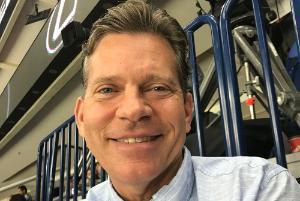

 |
|---|
| Joseph M. Miano, Ph.D. ’92 |
Is at the Heart of Cardiovascular Gene Therapy
For as far back as he can recall, Joseph M. Miano, Ph.D. ’92, has always been fascinated with the human heart. “Back in the early 1970s, when I was very young, my father was a paramedic. He’d bring home these anatomy books, and I remember pouring over pictures of hearts and clogged arteries,” he recalls. “While the other kids were outside playing, I was inside listening to seventies rock music while drawing pictures of hearts and blood vessels.”
Nearly four decades later, Dr. Miano is a professor in the Aab Cardiovascular Research Institute at the University of Rochester Medical Center. In his quest to better understand cardiovascular disease, he was among the first in the world to use the revolutionary CRISPR genome editing technology. The Miano lab was the first to generate a CRISPR animal model carrying subtle mutations in a control element that turns on a gene (Cnn1). “CRISPR is the new revolutionary technology which allows researchers to efficiently edit genomes, allowing scientists to precisely manipulate a DNA sequence. CRISPR is a huge game changer,” says Dr. Miano.
With the emergence of CRISPR technology, heightened concerns regarding the ethical implications related to human genome editing have followed. It’s a topic about which Dr. Miano speaks publicly and with great passion. During a discussion he led at the 2017 American Heart Association’s Annual Conference on Arteriosclerosis, Thrombosis, and Vascular Biology/Peripheral Vascular Disease (ATVB/PVD), Dr. Miano said, “These are thorny conversations in which the scientific community will be pivotal in leading discourse. Are we in the position to make decisions for people who don’t even exist yet? These are deeply philosophical questions that need to be discussed in the public realm. We must ensure that the public is informed, given voice and respected.”
While Dr. Miano credits his father as the force who sparked his desire to work at the cutting edge of cardiovascular research, there have been many other mentors along the way. “I was drawn to New York Medical College because of my chosen field of study called atherosclerosis. Dr. Michael Stemerman [M.D.] was a physician scientist at NYMC who led efforts to understand basic processes associated with this prevalent disease, so I applied and was accepted to the Graduate School of Basic Medical Sciences where I was able to rotate in Dr. Stemerman’s lab.” Another notable inspiration has been internationally-renowned cardiovascular researcher, Eric Olson, h.D., who was Dr. Miano’s post-doctoral advisor and mentor at the University of Texas MD Anderson Cancer Center. “Eric instilled independence, giving me free reign, and allowing me to carve out my own research niche,” he says. “I have borrowed this from Dr. Olsen’s playbook with glee—fostering autonomy and independence in my own lab. It’s important in this climate that junior scientists can go forward boldly with work that they developed in their own mind.”
Today, Dr. Miano is focused on developing precision gene editing—aimed at identifying the source of and then ultimately correcting genetic defects—using CRISPR-Cas9 in mouse models to help better understand and treat cardiovascular disease as well as other diseases in the body. “We edit the germline genome of mice and then use these mice to understand the fundamental questions about the control of genes. What turns these genes on and off, where and when, and also the functionality of proteins that otherwise would be intractable to study,” Dr. Miano says.
Most recently, he led his lab in a major breakthrough study published in PNAS. “While my lab was studying a genetic mutation in a mouse, unbeknownst to us, there was a lab in the Netherlands studying a human being. Within a genetically isolated community—a consanguineous (incestuous) population—who had a similar mutation as the one we were studying in mice,” Dr. Miano says. “One of my students learned about the clinical study and it became this beautiful convergence of sciences.
“This is one of the most interesting studies I’ve worked on, and definitely the best example of translational medicine,” he reveals, “but I’d like to think my most notable accomplishment—that the thing I’m proudest of—is yet down the road. I want to lead, mentor and build up the next generation. I’m 56 and, as George Harrison so eloquently wrote in the 1960s, ‘all things must pass.’ I’m at the point in my career wherein I’m thinking about the next generation of scientists to come. I want to teach them to ask good, solid questions and get them passionate about science. Motivate them to move forward. I want to be their biggest cheerleader.”